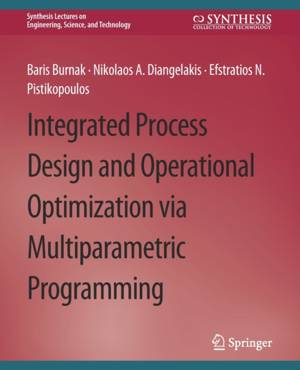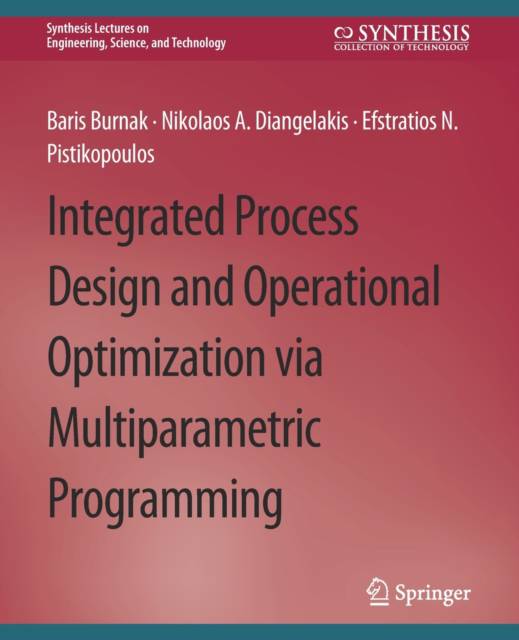
- Retrait gratuit dans votre magasin Club
- 7.000.000 titres dans notre catalogue
- Payer en toute sécurité
- Toujours un magasin près de chez vous
- Retrait gratuit dans votre magasin Club
- 7.000.0000 titres dans notre catalogue
- Payer en toute sécurité
- Toujours un magasin près de chez vous
Integrated Process Design and Operational Optimization Via Multiparametric Programming
Baris Burnak, Nikolaos A Diangelakis, Efstratios N PistikopoulosDescription
This book presents a comprehensive optimization-based theory and framework that exploits the synergistic interactions and tradeoffs between process design and operational decisions that span different time scales. Conventional methods in the process industry often isolate decision making mechanisms with a hierarchical information flow to achieve tractable problems, risking suboptimal, even infeasible operations. In this book, foundations of a systematic model-based strategy for simultaneous process design, scheduling, and control optimization is detailed to achieve reduced cost and improved energy consumption in process systems. The material covered in this book is well suited for the use of industrial practitioners, academics, and researchers.
In Chapter 1, a historical perspective on the milestones in model-based design optimization techniques is presented along with an overview of the state-of-the-art mathematical tools to solve the resulting complex problems. Chapters 2 and 3 discuss two fundamental concepts that are essential for the reader. These concepts are (i) mixed integer dynamic optimization problems and two algorithms to solve this class of optimization problems, and (ii) developing a model based multiparametric programming model predictive control. These tools are used to systematically evaluate the tradeoffs between different time-scale decisions based on a single high-fidelity model, as demonstrated on (i) design and control, (ii) scheduling and control, and (iii) design, scheduling, and control problems. We present illustrative examples on chemical processing units, including continuous stirred tank reactors, distillation columns, and combined heat and power regeneration units, along with discussions of other relevant work in the literature for each class of problems.
Spécifications
Parties prenantes
- Auteur(s) :
- Editeur:
Contenu
- Nombre de pages :
- 242
- Langue:
- Anglais
- Collection :
Caractéristiques
- EAN:
- 9783031009617
- Date de parution :
- 04-09-20
- Format:
- Livre broché
- Format numérique:
- Trade paperback (VS)
- Dimensions :
- 190 mm x 235 mm
- Poids :
- 453 g

Les avis
Nous publions uniquement les avis qui respectent les conditions requises. Consultez nos conditions pour les avis.






